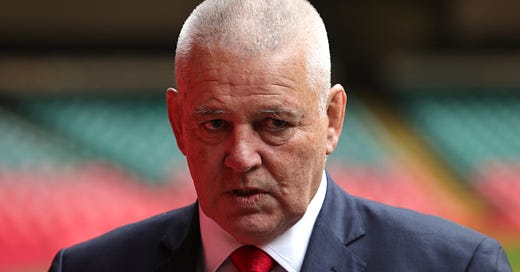The truth about how Warren Gatland's tenure unravelled
Warren Gatland has never been one to shy away from a challenge. His initial appointment as Wales’ head coach, 18 years ago, was a lifeline to a team in disarray. After Gareth Jenkins’ side failed dismally at the 2007 Rugby World Cup, Wales seemed to have lost their way. It was Gatland, though, who helped steady the ship, pulling Welsh rugby from the depths of despair and orchestrating a period of remarkable success. Yet, as is often the case, the second act rarely mirrors the first.
In a desperate move by former Welsh Rugby Union CEO Steve Phillips to save his own skin, Gatland returned to the Wales helm for a second term, but this time the situation was markedly different. The glory days had slipped into memory, and Welsh rugby was now grappling with deep-seated challenges. Despite the reverence in which he is held by Welsh rugby fans—who view him almost as a deity—Gatland's return could not undo the damage inflicted by years of mismanagement.
While Gatland undoubtedly played a crucial role in the success of the Welsh team during his first tenure, it was the broader infrastructure of Welsh rugby that facilitated those achievements. Between 2005 and 2012, Wales boasted one of the finest rugby academies in the world, producing a golden generation of players. Furthermore, during the early years of Gatland’s first reign, three of the four Welsh regions had won silverware and were competing at the business end of the Heineken Cup.
However, by the time Gatland was brought back, the damage caused by underinvestment in the pathway, as well as the regional game, had begun to show. Welsh players, once hailed for their athleticism and physicality, had become accustomed to mediocrity, with too many players failing to meet the standards set by their predecessors. In short, while Gatland should have got more out of the players, the broader decline in the game’s structure made his task far more difficult.
Gatland's coaching philosophy, which centred on pushing players to their physical and mental limits, was pivotal to the success of Wales’ golden generation. Players such as Alun Wyn Jones, Dan Biggar, Sam Warburton, and Jonathan Davies thrived under Gatland’s strict but effective management. But in his second stint, the landscape had changed. Players were no longer as receptive to his methods while failure had become normalised across Welsh rugby. His brand of directness, while effective in the past, had grown dated.
Keep reading with a 7-day free trial
Subscribe to Inside Welsh Rugby to keep reading this post and get 7 days of free access to the full post archives.





